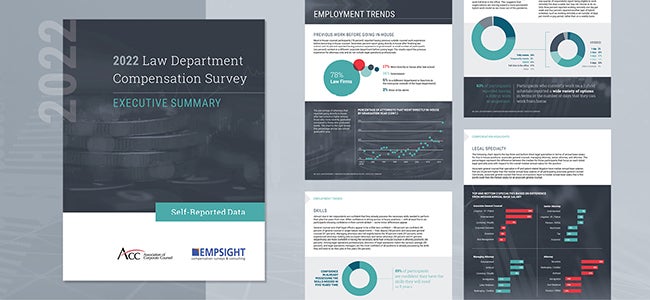Banner artwork by kentoh / Shutterstock.com
Each year, ACC conducts an extensive compensation survey capturing salary data from nearly 20,000 in-house legal professionals across hundreds of companies in the United States. We are able to collect such a large number of responses due to our hybrid data collection process, which allows for the data to be reported at the individual- and company-level.
The individual-level survey is structured as a conventional online survey and is designed for one person to report compensation. The company-level survey allows for the data to be reported for all positions in the legal department. In addition to lawyers, this includes paralegals, administrators, non-lawyer positions in compliance, government relations, privacy, as well as contract negotiators and administrators. This almost always requires human resources (HR) or the compensation department to fill out the survey for the legal department. However, the individual-level survey allows us to ask specific questions that only the targeted respondent would know. This allows us to report findings that are not compensation-specific such as previous work experience, the likelihood of changing jobs, and the kinds of skills that are most important for in-house legal professionals. We present the top five findings from the individual-level survey below.
1. Company revenue is a major pay driver.
Company revenue is the single largest driver of compensation out of all demographic characteristics captured in the survey.
Company revenue is the single largest driver of compensation out of all demographic characteristics captured in the survey. There is variation across industry and geography but on average, companies considered high revenue pay more than companies under that threshold. Respondents at the richer companies earn more in base salary and total compensation across all job positions surveyed. The most striking differences are observed in leadership positions. For example, chief legal officers (CLOs) in US$5 billion+ companies earn an average of 66 percent more in base salary and 232 percent more in total compensation compared to CLOs in companies with under US$1 billion in revenue. Total annual compensation for CLOs in US$5 billion+ companies average US$1.15 million while those in companies under US$100 million average US$320,000.
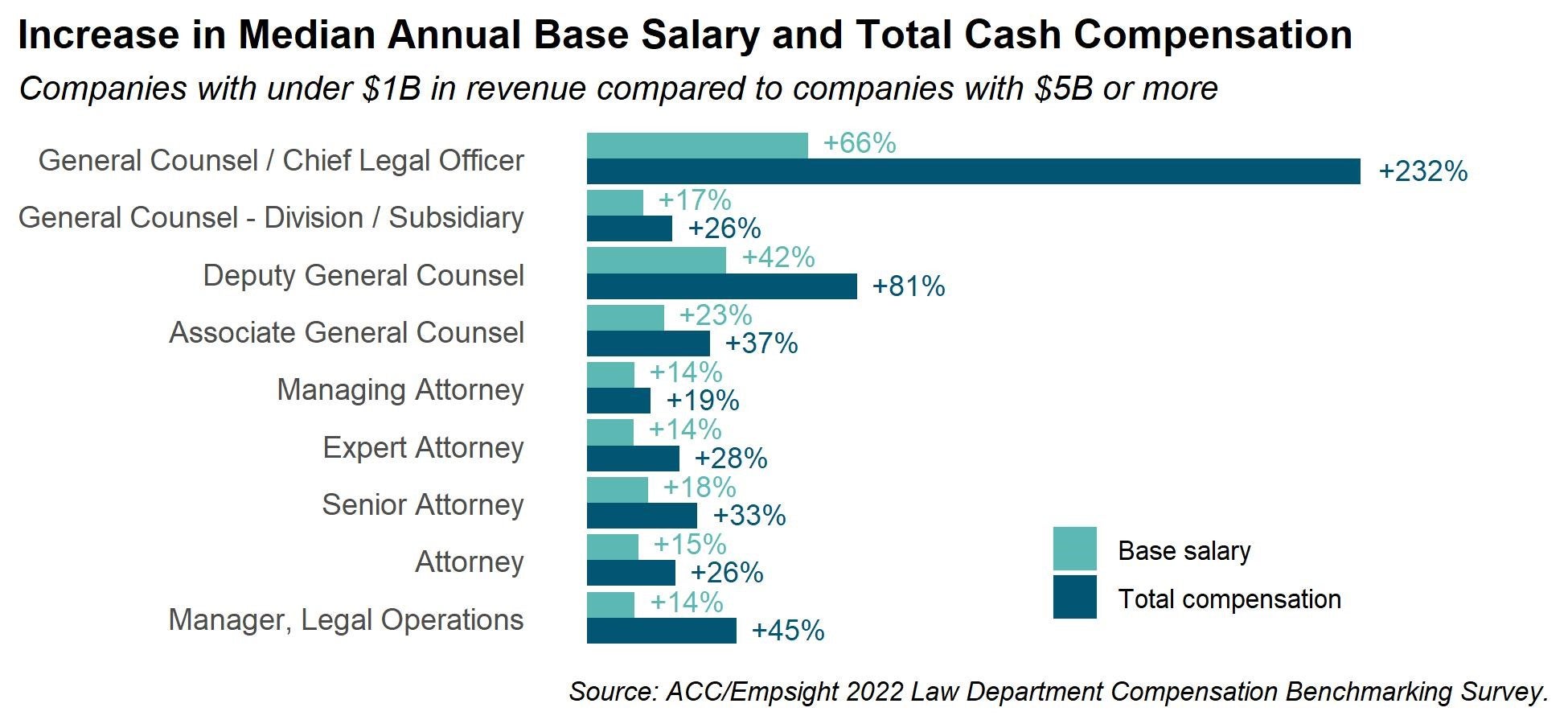
2. Experience and law school rank impact compensation.
It should come as no surprise that those with more experience earn more on average. For example, CLOs who graduated from law school prior to 2000 earn base salaries that are 45 percent higher and make 86 percent more in total compensation (base salary, bonuses, incentives) than CLOs who graduated after 2010. This is true across all positions, but the differences are less extreme among more junior positions since these professionals have had less experience in the profession overall. What is more surprising is the impact of law school ranking. CLOs who attended a top 20 law school are earning an average of 25 percent more in base salary and 41 percent more in total compensation compared to other CLOs. Presumably, the majority of the top 20 law school graduates may have begun their careers at top law firms and were therefore more likely to command higher salaries when moving in-house.
Presumably, the majority of the top 20 law school graduates may have begun their careers at top law firms and were therefore more likely to command higher salaries when moving in-house.
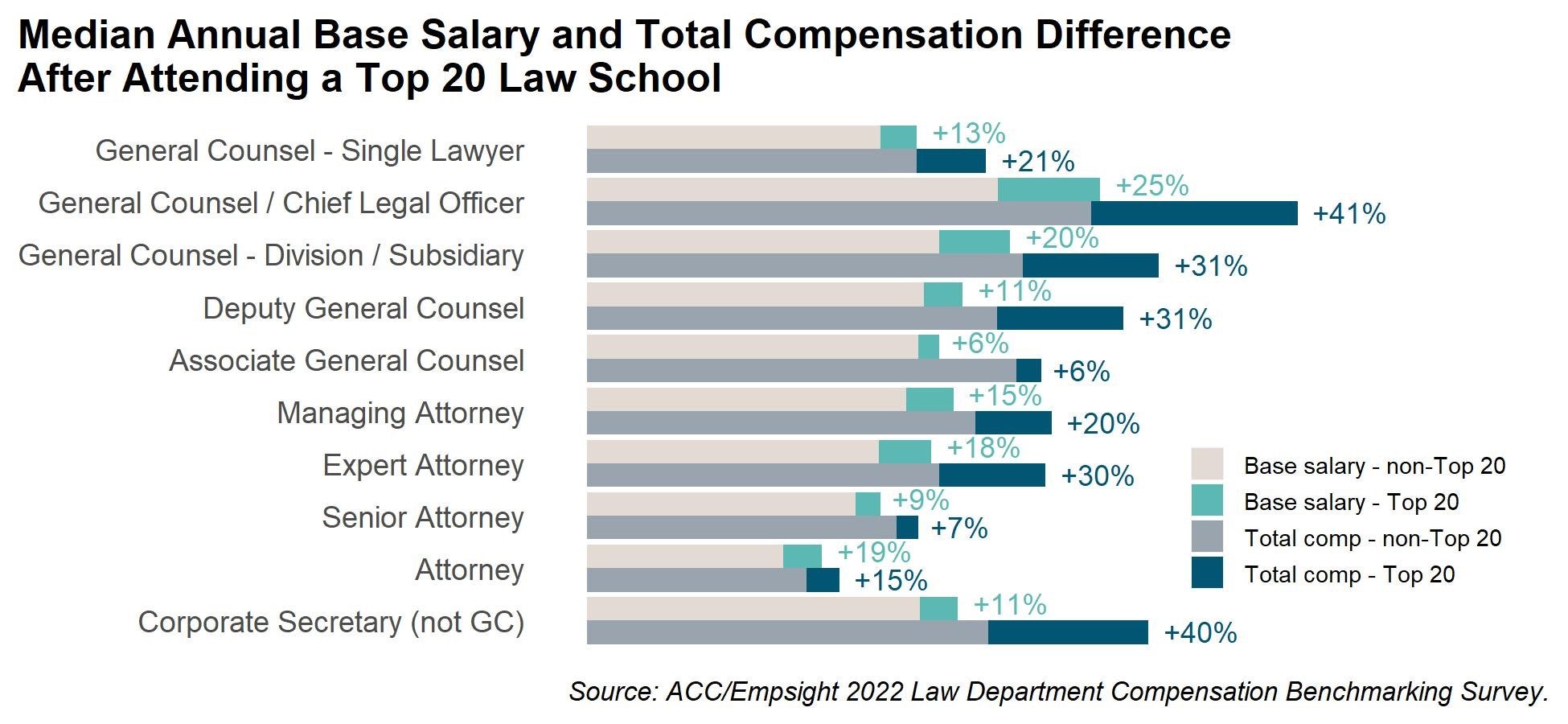
3. Compensation is higher on average for those with law firm experience.
Across all job positions surveyed, those who have previous law firm experience prior to working in-house earn more on average compared to those who do not. Going directly to in-house from law school was reported by 17 percent. We therefore have a sizeable population to compare against. More junior lawyers (e.g., those with approximately one to five years of experience) earn 12 percent more in base salary and in total compensation compared to those without law firm experience. CLOs with law firm experience earn an average of 20 percent more in base salary and 16 percent more in total compensation. The differences are less pronounced among managing attorneys and expert attorneys.
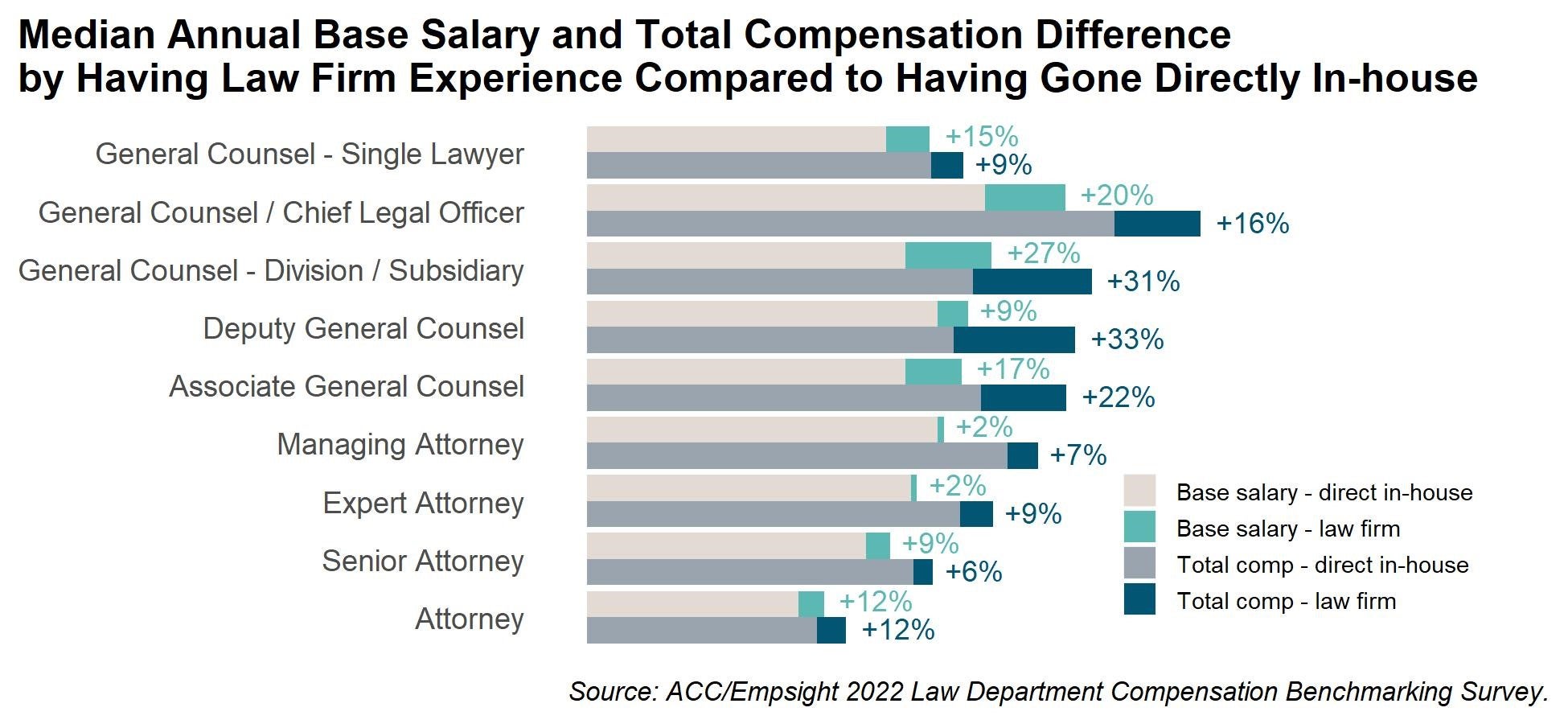
4. Many in-house lawyers are likely to seek out another job in the next year.
A sizable chunk of survey respondents (one-third) reported having changed jobs in the past two years and 18 percent said they are “likely” or “very likely” to change jobs in the next year. There is considerable variation across industries. In the pharmaceutical industry, 46 percent of respondents said they changed jobs in the last two years (the second highest percentage among all industries) and 24 percent said they are likely to change jobs within the next year (the highest percentage among all industries). Those in utilities (21 percent) and associations (22 percent) had the fewest respondents who had changed jobs in the past two years. Those in associations were also the least likely to say they are planning to change jobs in the next year (six percent).
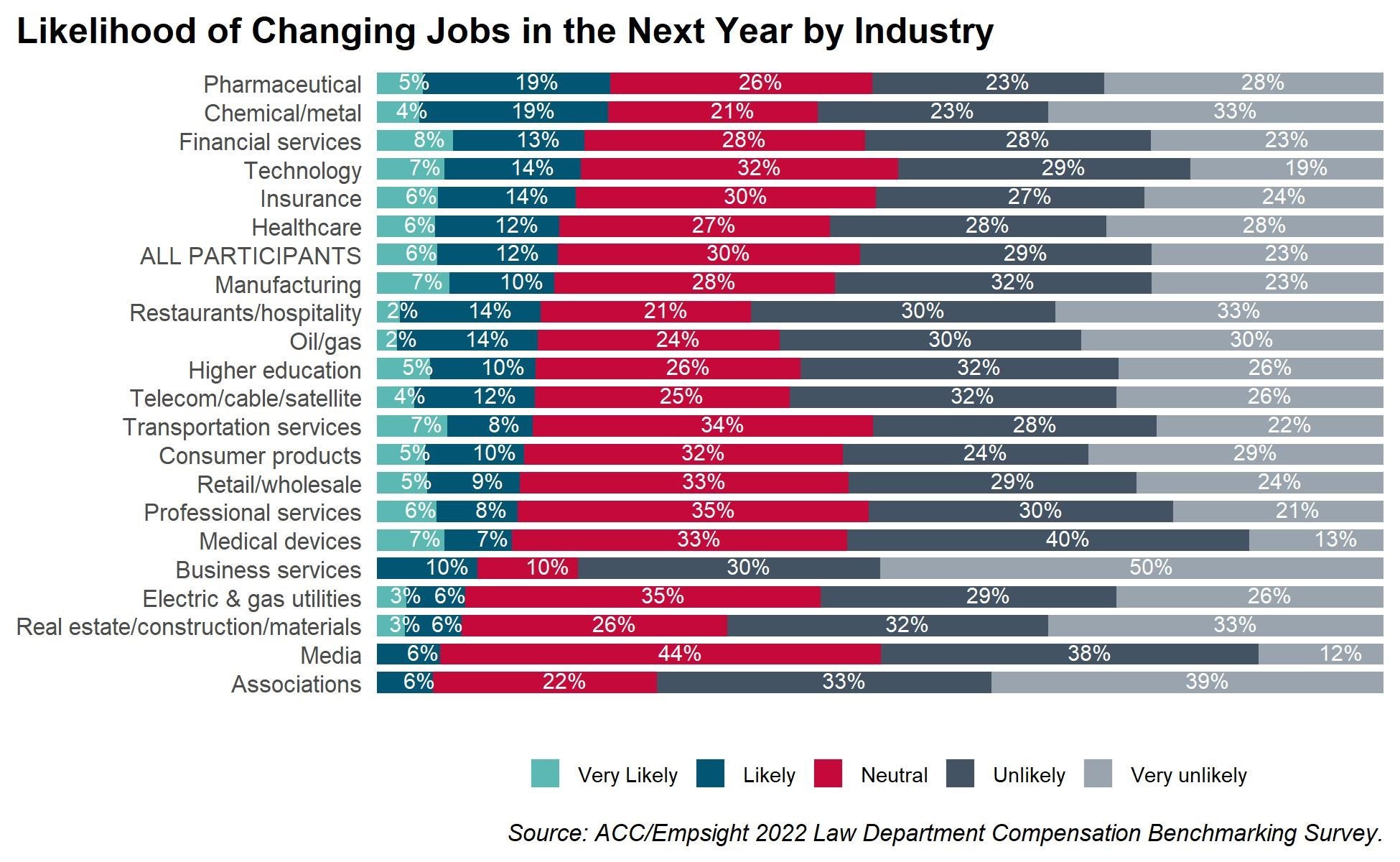
5. Communication is the most important soft skill to succeed in-house.
Communication and listening skills topped the list of most important non-legal skills needed to succeed in-house according to survey respondents (87 percent), over and above business skills (76 percent), and leadership skills (67 percent). While these are critical skills for in-house professionals across all levels, CLOs reported a greater emphasis on leadership skills while more junior staff more frequently reported a focus on having time management skills. Skills considered least important were financial management (14 percent), data analytics (13 percent), scientific skills (five percent), and multilingual skills (three percent).
CLOs reported a greater emphasis on leadership skills while more junior staff more frequently reported a focus on having time management skills.
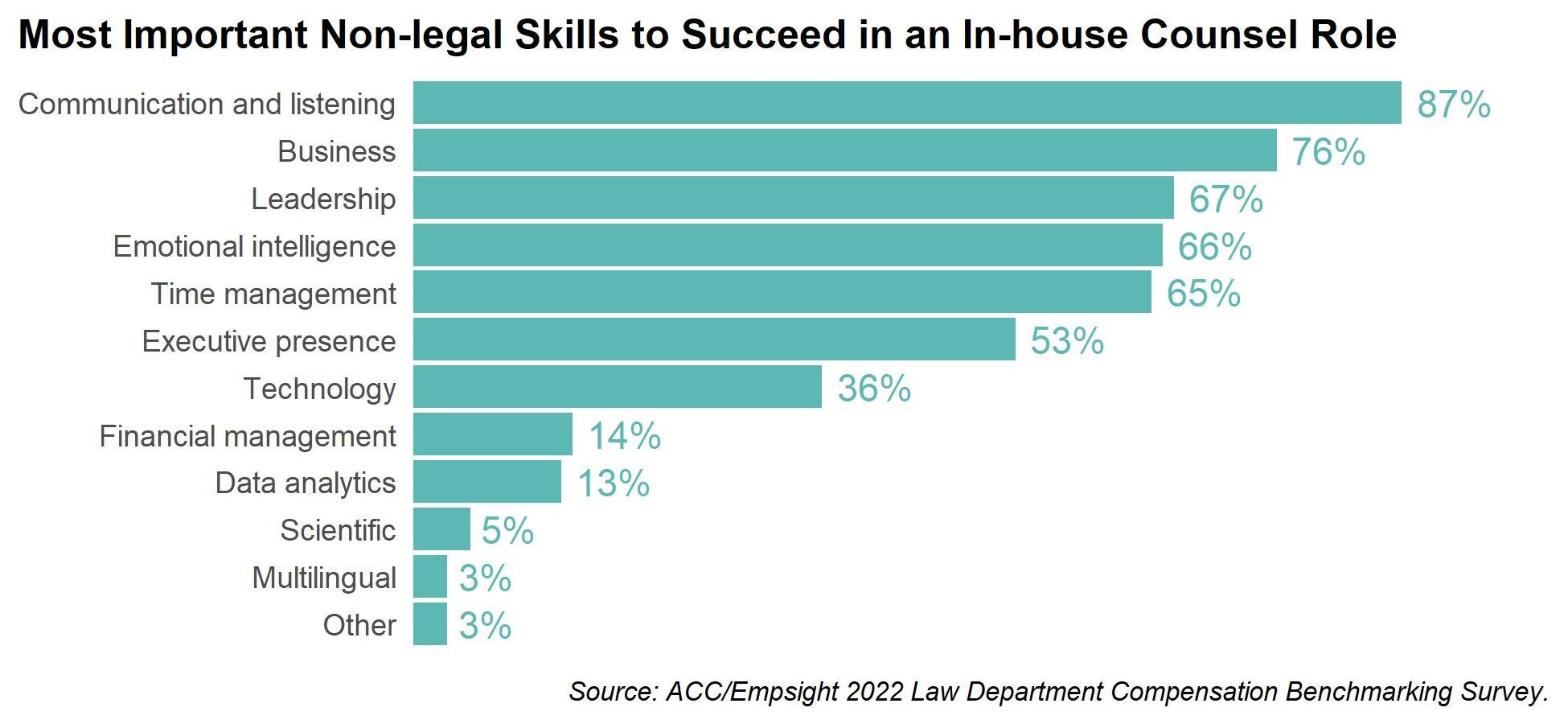
Download the report’s executive summary and learn more about the suite of benchmarking reports offered. ACC membership is not required to participate in the annual survey, and all participants receive the full compensation benchmarking report (self-reported data edition) when released each September.
